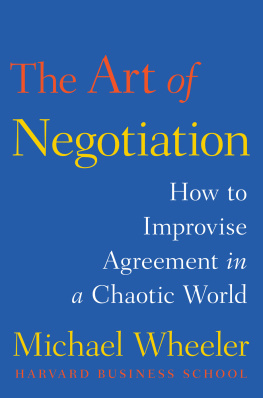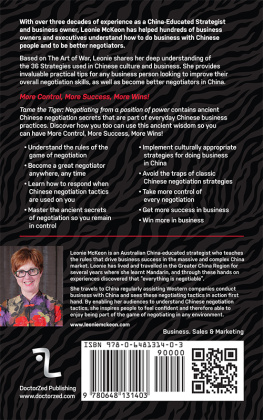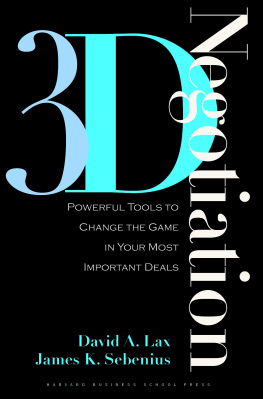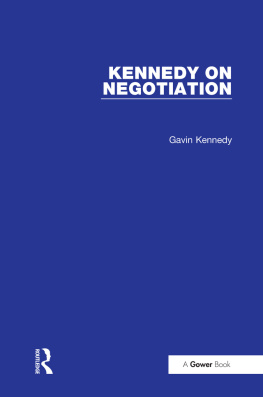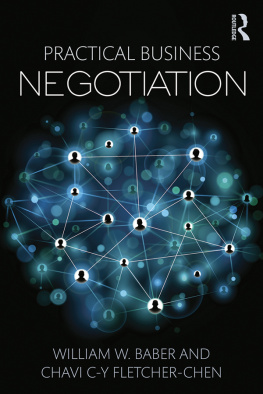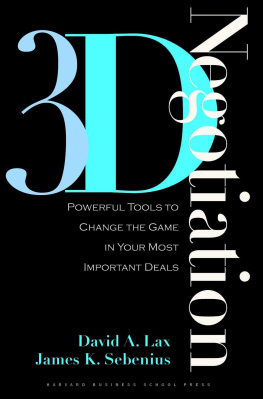Thank you for downloading this Simon & Schuster eBook.
Join our mailing list and get updates on new releases, deals, bonus content and other great books from Simon & Schuster.
C LICK H ERE T O S IGN U P
or visit us online to sign up at
eBookNews.SimonandSchuster.com
Contents
For Cally, Edie, and Kate
With love and gratitude
For every complex problem, there is a solution that is simple, neat, and wrong.
JOURNALIST AND ESSAYIST H. L. MENCKEN
[ 1 ] Embracing Chaos
As manager of a private investment firm, Jay Sheldon bought a small cable television company in the Midwest some years ago. He didnt know much about the industry, but the $8 million price seemed right, and the purchase would let him test the water. Jay and his partners quickly got the business into the black. A year later, they wanted to expand by acquiring nearby systems. After running the numbers, they figured that they could pay $11 million, maybe $12 million tops, to buy a second cable company in a neighboring city.
Jay began an extended series of talks with its owner, but after two months of back-and-forth, it became obvious that the parties were far apart on price. Listen, the other owner said. I didnt post a For Sale sign. You came to me. Youd have to dump fifteen million in cash right on my desk to tempt me. And Id probably kick myself if I took it.
Sheldon understood that this wasnt a bluff, but he also felt the demand was unrealistic. By conventional logic, the parties were deadlocked. If a sellers bottom line is three million higher than the buyers absolute top dollar, you cant have a deal.
Or can you?
Let me ask one last question, Sheldon said before getting up to leave. If you think your system is worth fifteen million, how about ours?
Oh, yours is a bit smaller, was the answer. Id say fourteen or so.
Sheldon turned the deal upside down. He adroitly became the seller instead of a buyer . In a little more than a year, he flipped his own system for almost twice what his firm had paid for it (and much of that had been leveraged). He was still bullish on cable, but when he encountered this particular owner, who was rabid about the industry, Sheldon had the agility to transform an apparent impasse into a lucrative sale.
His solution was clever. More important, though, was his nimble mind-set. In the impediment to his hoped-for acquisition, Sheldon spotted the seed of another deal that would serve him even better. When he let go of his initial plan, the insight arrived in a flash.
Sheldons agility is the mark of a master negotiator. Yes, preparation is important, but negotiation is a two-way street. We cant script the process. Whoever sits across the table from us may be just as smart, determined, and fallible as we are. We cant dictate their agendas, attitudes, or actions any more than wed let them dominate us. Adaptability is imperative in negotiation from start to finish. Opportunities will pop up. So will obstacles. Power ebbs and flows. Talks that crawl along can race forward or veer off in another direction. Even our own objectives may evolve. We have to make the best of whatever unfolds.
Negotiators like Sheldon are great improvisers. When things arent going well, theyll float a clever proposal, crack a joke, or even challenge the other side. If need be, theyll also make major changes in strategy. Whats odd, though, is that there isnt much about improvising in standard negotiation books. Thats true both for the hardball manuals on dominating the other side and for the win-win texts that preach joint problem solving. In spite of their obvious differences, both approaches start with the same static premise that you have your given interests and I have mine. The win-win message is that by laying your cards on the table, you can expand the pie by making mutually beneficial trades. The hardball line tells you to chest your cards (and maybe slip a couple up your sleeve).
But theres much more to negotiation than bluffing and trading. The challenge lies in the fact that preferences, options, and relationships are typically in flux. Theorists may have sidestepped this reality, but top negotiators understand this very well.
Ive seen this in my own research and also thanks to the work of colleagues at the Program on Negotiation (a cross-disciplinary consortium of negotiation experts at Harvard, Massachusetts Institute of Technology, and Tufts University). In a ten-year project led by Jim Sebenius, weve analyzed the work of great negotiators in a wide range of fields. Theyve included diplomats such as George Mitchell, who mediated peace in Northern Ireland; investment banker Bruce Wasserstein; and the visionary artists Christo and Jeanne-Claude.
The contexts in which these virtuosos negotiated differed. Their personalities ran the gamut as well. Some had a certain gravitas, while others were warm and entertainingeven funny. Yet in our workshops with them, they all emphasized the dynamic nature of negotiation and the importance of agility. The late ambassador Richard Holbrooke, who forged the accord ending the bloodshed in the Balkans, described negotiation as being more like jazz than science. Its an improvisation on a theme, he said. You know where you want to go, but you dont know how to get there. Its not linear.
UN special envoy Lakhdar Brahimi, having mediated in some of the worlds most violent and unpredictable trouble spots, used a nautical metaphor to express the same idea. Negotiators must always navigate by sight, he cautioned. No matter how diligently we prepare, were bound to encounter surprises, pleasant and otherwise, that warrant course corrections.
Donald Dell, the sports agent-marketer, made his mark by hammering out huge contracts for basketball players Patrick Ewing and Moses Malone and earning millions in endorsement deals for tennis stars Arthur Ashe and Jimmy Connors. Hes orchestrated bidding wars between rival television networks for broadcasting rights to events like the French Open.
Dell has also done very well negotiating on his own behalf. In 1998 he sold his sports management firm ProServ to an entertainment company for what he describes as the proverbial offer I couldnt refuse. A few years later, after buying much of it back for twenty cents on the dollar, he then resold his interest to Lagadre Unlimited, where he is group president in charge of TV deals, events, and tennis.
For all his success, though, Dell is quick to say that things often dont go according to plan. I cant tell you how many times I arrived prepared for a negotiation, only to have someone or something come up that upset or changed the deal I thought I was doing. The only way to protect yourself one hundred percent against this situation is to assume there is something you dont know. This advice will not only keep your mind up to speed with the deal and force you to consider other parties motivations, but it will also keep your ego in check.
LEARNING, ADAPTING, AND INFLUENCING
Lesser known but highly talented deal makers make the same point. Tom Green is a remarkable negotiator who has worked in both the private and public sectors. Tom was a key figure in the sale of a storied baseball franchise and helped restructure a failing health maintenance organization (HMO) that many thought was headed for bankruptcy.
Tom also served on the public interest team that resolved massive litigation against the tobacco industry. Until that time, Big Tobacco had never lost a case or paid a dime to settle health claims out of court. When Mississippi, Massachusetts, and a few other states filed suit to recover Medicaid costs for smoking-related illnesses, their effort seemed quixotic. Yet one by one, Green and his colleagues enlisted forty other states to join the effort. That momentum brought the tobacco companies to the bargaining table. In 1998 the industry bowed to more stringent regulation and agreed to pay $350 billion in damages.
Next page
